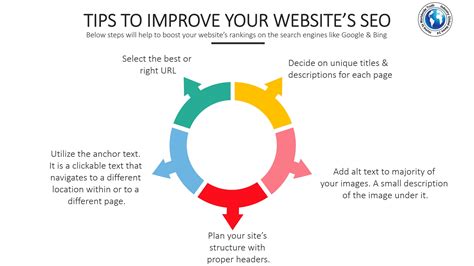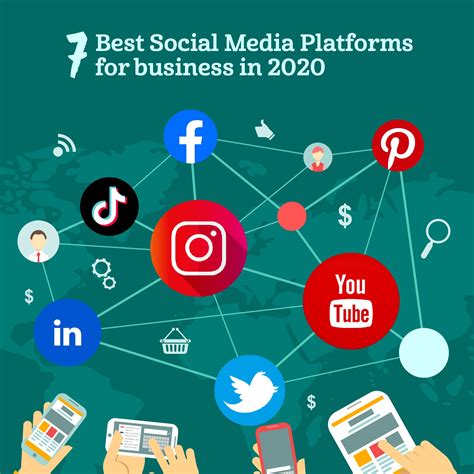Being seen and recognized online is a quintessential goal for any business or individual operating a web presence. Having a compelling website is just the beginning, as the real challenge lies in making it stand out amidst the ever-expanding virtual landscape. Luckily, there are countless tactics you can employ to increase the visibility and exposure of your online platform. In this article, we will delve into ten pragmatic strategies that will help elevate your website's prominence and ensure its forward momentum in the digital realm.
1. Optimize Your Content: The cornerstone of gaining visibility is crafting high-quality, relevant content that resonates with your target audience. By incorporating appropriate keywords and phrases throughout your website, search engines will be more likely to rank your pages higher in the search results.
2. Create a Solid Link Building Strategy: Building a network of quality backlinks is an effective way to boost your website's credibility and improve its search engine ranking. Seek out authoritative websites in your industry and establish valuable connections through guest posting, collaborations, or resource sharing.
3. Engage with Social Media: Social media platforms provide an unparalleled opportunity to engage directly with your audience and share your website's content. Actively participating in discussions, sharing valuable insights, and promoting your brand can significantly enhance your website's visibility among a wider audience.
4. Harness the Power of Local SEO: If your website caters to a specific geographic area, optimizing it for local search queries is essential. Utilize location-specific keywords, list your business on online directories, and encourage customer reviews to boost your website's visibility within your target region.
5. Leverage the Potential of Influencer Marketing: Collaborating with influential individuals in your industry can be a game-changer when it comes to enhancing your website's visibility. By leveraging the reputation and reach of these influencers, your brand can gain exposure to their loyal audience, leading to increased traffic and credibility.
6. Invest in Paid Advertising: While organic methods are powerful, paid advertising can provide you with an immediate and significant boost in visibility. Choose platforms and ad formats that align with your target audience and strategic goals, and monitor your campaigns closely to ensure optimal results.
7. Optimize for Mobile: In today's mobile-dominated world, having a website that is optimized for mobile devices is imperative. Ensure that your website is responsive, loads quickly, and offers an exceptional user experience across various screen sizes, as this can greatly enhance your visibility in search engine rankings.
8. Attend Industry Conferences and Events: Participating in industry-related conferences, trade shows, and events can provide valuable networking opportunities and expose your website to a wider audience. Sharing insights, connecting with like-minded individuals, and showcasing your expertise can contribute to increased visibility for your website.
9. Implement On-Page SEO Techniques: Employing on-page SEO techniques such as optimizing your meta tags, utilizing header tags, and creating a logical site structure can significantly improve your website's search engine optimization. This, in turn, enhances its visibility and discoverability by search engines.
10. Regularly Analyze and Refine Your Strategies: Monitoring and analyzing the performance of your website's visibility strategies is crucial for continuous improvement. Stay updated on the latest trends, evaluate the effectiveness of your tactics, and adapt as needed to ensure that your website remains at the forefront of your target audience's attention.
In conclusion, increasing your website's visibility requires a multifaceted approach, incorporating a combination of on-page optimization, content creation, social media engagement, and targeted marketing strategies. By implementing the techniques outlined in this article and continually refining your strategies, you can establish a robust online presence that will propel your website to new heights of visibility and success.
Improving Your Website's On-Page SEO

In this section, we will explore effective strategies and techniques to enhance the on-page SEO of your website, allowing it to rank higher in search engine results and attract more organic traffic. By implementing these optimization methods, you can improve the visibility and overall performance of your online platform.
1. Crafting Keyword-Rich Content:
Developing compelling and informative content that incorporates relevant keywords is crucial for maximizing your website's on-page SEO. By conducting thorough keyword research and strategically placing these keywords throughout your content, you can increase the chances of search engines recognizing the relevance of your website for specific search queries.
2. Optimizing Meta Tags and Titles:
Meta tags and titles play a crucial role in improving your website's visibility in search engine results pages. By optimizing these tags with relevant keywords and concise descriptions, you can enhance the chances of users clicking on your website when it appears in search results, ultimately boosting your organic traffic.
3. Enhancing Website Speed and Performance:
Ensuring that your website loads quickly and functions smoothly is essential for optimizing your on-page SEO. Search engines prioritize websites that provide a seamless user experience, so it is essential to optimize images, minimize code, enable browser caching, and leverage other techniques to enhance your website's speed.
4. Implementing Proper Header Tags:
Utilizing header tags, such as H1, H2, and H3, effectively not only enhances the readability and organization of your content but also contributes to the optimization of your on-page SEO. Ensuring that you use appropriate header tags to structure your content and incorporate relevant keywords can positively impact search engine rankings.
5. Creating Engaging Meta Descriptions:
Meta descriptions represent brief summaries of your web page content and appear in search engine results. By crafting compelling and concise meta descriptions that include relevant keywords, you can increase the likelihood of users clicking on your website, thereby improving your visibility and attracting more organic traffic.
By implementing these strategies to optimize your website's on-page SEO, you can strengthen its online presence and increase its chances of ranking higher in search engine results, ultimately driving more traffic and improving the visibility of your platform.
Creating Quality and Relevant Content
In today's digital landscape, one of the most crucial factors in increasing online visibility and attracting a targeted audience is through the creation of quality and relevant content. By producing content that offers value, addresses the needs of your target market, and aligns with their interests, you can establish your website as a go-to resource and improve your organic search ranking.
Here are several strategies to consider when creating content that not only captures your audience's attention but also boosts your website's visibility:
- Identify your target audience: Understand your audience's demographics, interests, and pain points to create content that resonates with them. Conduct thorough research, analyze data, and utilize surveys or interviews to gather valuable insights.
- Perform keyword research: Utilize keyword research tools to identify relevant keywords and phrases that are frequently searched for within your industry. Incorporate these keywords naturally throughout your content to improve its visibility in search engine results.
- Produce original and unique content: Creating content that is unique, informative, and insightful helps you stand out from your competitors. Offer a fresh perspective, share personal experiences, and provide actionable advice that your audience can benefit from.
- Focus on relevance: Ensure that your content is relevant to your niche or industry. Understand your audience's needs, interests, and pain points, and tailor your content to address those specifically.
- Provide value: Offer your audience valuable information, insights, or solutions to their problems. By consistently delivering valuable content, you can establish credibility and authority within your industry.
- Utilize different content formats: Experiment with various content formats such as blog articles, videos, infographics, podcasts, or case studies. Cater to different learning styles and preferences, and make your content more engaging and shareable.
- Optimize for search engines: Ensure that your content is properly optimized for search engines. Use relevant headings, meta descriptions, and alt tags for images to improve your website's visibility in search engine results pages.
- Encourage social sharing: Implement social sharing buttons on your website to make it easy for your audience to share your content on social media platforms. This can help increase your content's reach and visibility.
- Regularly update and refresh your content: Keep your content up-to-date by regularly updating it with new information, statistics, or examples. This not only keeps your website relevant but also signals to search engines that your content is fresh and valuable.
- Build internal and external links: Incorporate internal links to other relevant pages on your website to improve navigation and encourage visitors to explore more of your content. Additionally, seek opportunities for external link building by guest blogging or participating in industry collaborations.
By implementing these strategies and consistently creating quality and relevant content, you can enhance your website's visibility, attract a targeted audience, and establish your brand as an authoritative source within your industry.
Utilizing Social Media Platforms for Promotion

In this section, we will explore the powerful potential of leveraging social media platforms to enhance the visibility of your website. By tapping into the vast reach and engagement of social media, you can effectively promote your online presence to a wider audience and increase your website's exposure.
1. Harness the power of social networking: Connect with your target audience by creating profiles on popular social media platforms like Facebook, Twitter, and LinkedIn. Regularly engage with your followers, share valuable content, and encourage them to visit your website for more information.
2. Create compelling visual content: Capture attention and drive traffic to your website by producing eye-catching images, infographics, and videos. Utilize platforms like Instagram, Pinterest, and YouTube to showcase your visual content and direct users to your website for more details.
3. Engage in conversations: Actively participate in relevant discussions and communities on social media platforms. Join groups and forums related to your industry, share your expertise, and provide valuable insights. By establishing yourself as an authority, you can attract visitors to your website who are seeking further information or solutions.
4. Leverage influencers: Identify influential individuals or brands within your niche and collaborate with them to promote your website. By partnering with influencers, you can reach their dedicated followers and leverage their credibility to increase your website's visibility and credibility.
5. Utilize hashtags strategically: Research and incorporate relevant hashtags in your social media posts to increase their discoverability. Hashtags help categorize your content and make it easier for users interested in specific topics to find your website.
6. Run contests and giveaways: Encourage user engagement and attract new visitors by organizing contests and giveaways on social media. Offer prizes or exclusive discounts that require participants to visit your website, creating an opportunity for them to explore your products or services further.
7. Regularly share blog posts and articles: Publish informative and engaging blog posts or articles on your website and share them on social media platforms. By consistently providing valuable content, you can establish yourself as a trusted source in your industry and drive traffic to your website.
8. Monitor and respond to feedback: Actively monitor social media platforms for mentions, comments, and messages related to your website. Promptly respond to user feedback, address any concerns, and show genuine interest in engaging with your audience. This enhances your website's reputation and encourages visitors to explore your website further.
9. Collaborate with other businesses: Partner with complementary businesses or industry peers to cross-promote each other's websites on social media. By aligning your brand with others in your industry, you can tap into their existing customer base and increase your website's visibility.
10. Analyze data and optimize: Utilize analytics tools to track the performance of your social media efforts. Analyze data such as engagement rates, click-through rates, and conversion rates to identify what strategies are most effective. Continuously optimize your social media promotion techniques to achieve maximum visibility for your website.
Building High-Quality Backlinks to Enhance Your Website's Visibility
In this section, we will explore the significance of establishing high-quality backlinks and how they can greatly improve your website's visibility in search engine results. Backlinks play a pivotal role in enhancing your website's reputation and authority, ultimately leading to increased organic traffic and improved search engine rankings. Incorporating effective strategies to build a strong network of backlinks from reputable and relevant sources is crucial for driving targeted traffic to your website.
To begin with, it is essential to focus on acquiring backlinks from authoritative websites that possess a strong online presence. These reputable websites are often seen as trustworthy sources by search engines, and having them link back to your website can significantly boost your credibility and visibility. Seek out opportunities to collaborate with industry influencers, well-established blogs, and industry-related websites to establish valuable backlinks.
- 1. Guest Blogging: Contribute high-quality guest posts to popular websites within your niche. This not only helps you establish yourself as an authority but also allows you to include relevant backlinks to your website within your content.
- 2. Content Promotion: Create valuable and shareable content that naturally attracts backlinks. By promoting your content through social media, email marketing, and other channels, you increase the chances of other websites linking back to your content.
- 3. Resource Link Building: Offer valuable resources on your website such as guides, tutorials, or industry reports. You can then reach out to related websites and request them to link to your resource, providing a valuable backlink to your website.
- 4. Influencer Outreach: Connect with influencers in your industry and build genuine relationships. By collaborating with these influencers, you can gain backlinks from their websites and tap into their audience, increasing your visibility and reach.
- 5. Broken Link Building: Identify broken links on authoritative websites within your niche and reach out to the website owner with a suggestion to replace the broken link with a link to a relevant page on your website. This technique helps you earn backlinks while assisting the website owner in fixing their broken links.
Remember, while it is important to focus on acquiring backlinks, the emphasis should always be on quality over quantity. Search engines value backlinks from trusted and relevant sources, so avoid engaging in practices that may result in acquiring low-quality or spammy backlinks. Building high-quality backlinks requires time, effort, and a strategic approach, but the rewards in terms of improved visibility, increased traffic, and higher search engine rankings are well worth it.
Improving Website Loading Speed and User Experience

In the digital realm, enhancing the loading speed and user experience of your website is paramount to ensuring its success. This section will delve into effective strategies and techniques that can be employed to optimize loading times and provide visitors with a seamless browsing experience.
Fine-tune your website's performance: One of the fundamental aspects of improving loading speed is optimizing the performance of your website as a whole. This can be achieved by minimizing HTTP requests, compressing files, and reducing the number of plugins and scripts used. By streamlining your website's performance, you can significantly enhance its loading speed and overall user experience.
Optimize images: Images play a crucial role in engaging visitors, but their large file sizes can hinder loading times. By optimizing images with appropriate compression techniques and choosing the right file formats, such as JPEG or PNG, you can strike a balance between visual quality and loading speed. Additionally, implementing lazy loading techniques can help prioritize the loading of visible images, further improving user experience.
Clean and efficient coding: Well-organized and optimized code can significantly improve the loading speed and functionality of your website. Minimizing unnecessary code, leveraging browser caching, and utilizing minification techniques can all contribute to a faster and more efficient browsing experience for your users.
Utilize content delivery networks (CDNs): CDNs distribute your website's content across multiple servers geographically, reducing the distance between users and the server and consequently improving loading times. By utilizing a CDN, your website can deliver content more efficiently to users from various locations around the world.
Implement caching mechanisms: Caching allows your website to store temporary copies of web pages, reducing server load and improving loading speed for returning visitors. By utilizing browser caching and server-side caching strategies, you can significantly enhance the performance and user experience of your website.
Mobile optimization: With the increasing prevalence of mobile browsing, optimizing your website for mobile devices is essential. Implementing responsive design, optimizing images and content for smaller screens, and reducing unnecessary elements can greatly improve loading speed, functionality, and user experience on mobile devices.
Reduce redirects: Redirects can add unnecessary HTTP requests and increase loading times. By minimizing the use of redirects and ensuring they are necessary and efficient, you can improve the loading speed and user experience of your website.
Enable browser caching: Browser caching allows web browsers to store static files from your website, reducing the need to fetch them from the server every time a user visits. By specifying caching headers and implementing caching mechanisms, you can significantly enhance loading speed and improve user experience for returning visitors.
Optimize CSS and JavaScript: Minimizing and compressing CSS and JavaScript files can significantly reduce file sizes and improve loading speed. Additionally, utilizing asynchronous loading techniques and placing scripts at the bottom of your web pages can prevent rendering blocking and enhance user experience.
Regularly monitor and analyze: To ensure ongoing optimization, it is crucial to regularly monitor and analyze the loading speed and user experience of your website. Utilize performance tracking tools, analyze user behavior, and make data-driven optimizations to continuously improve the performance and overall user satisfaction of your website.
Implementing Targeted Keywords in Your Website's Content
Enhancing the visibility of your website and attracting more organic traffic can be achieved by strategically incorporating targeted keywords into your website's content. By integrating relevant and specific keywords throughout your website, you can optimize your content for search engines and effectively reach your target audience.
1. Research keywords: Conduct thorough research to identify the most relevant and high-performing keywords related to your industry, products, or services. Use online tools to find popular search terms and determine their search volume and competition level.
2. Understand user intent: Consider the intention behind each keyword to understand what users are searching for and how your website can fulfill their needs. This insight will help you create content that aligns with user expectations.
3. Develop a keyword strategy: Create a comprehensive keyword strategy that outlines which keywords you will target on each page of your website. Assign primary and secondary keywords to specific pages and plan their implementation accordingly.
4. Optimize page titles: Incorporate your primary keyword into the title of each page to signal its relevance to search engines. Craft concise and attention-grabbing titles that accurately represent the content of the page.
5. Create compelling meta descriptions: Write unique and engaging meta descriptions for each page, including relevant keywords. These snippets appear as brief summaries in search engine results and can significantly impact click-through rates.
6. Use headers and subheaders: Structure your content using headers (H1, H2, H3, etc.) and include targeted keywords in them. This organization not only enhances readability for users but also signals to search engines the main topics of your content.
7. Integrate keywords naturally: Infuse keywords throughout your content organically, making sure your writing flows smoothly and provides value to your audience. Avoid excessive keyword usage, as it may harm your website's ranking.
8. Optimize image alt tags: Assign descriptive alt tags to your website's images, incorporating relevant keywords where appropriate. Alt tags help search engines understand the content of the images and improve accessibility for visually impaired users.
9. Write optimized URLs: Create clean and concise URLs that include targeted keywords. Avoid lengthy or complex URLs that may confuse search engines and users.
10. Monitor and refine: Regularly review your website's performance and analyze how well your targeted keywords are driving traffic and engagement. Use analytics tools to gain insights and make adjustments to your keyword strategy as needed.
By implementing targeted keywords effectively, you can maximize your website's visibility, improve its search engine rankings, and ultimately attract more quality traffic.
Enhancing Website Traffic through Email Marketing

In the realm of digital marketing, there are numerous approaches to enhance the visibility and traffic of a website. One powerful yet often overlooked strategy is leveraging email marketing. By actively incorporating email marketing into your overall marketing efforts, you can significantly increase the traffic to your website and create meaningful engagement with your target audience.
1. Create an Engaging Email List: Start by building a comprehensive and well-segmented email list of potential customers. Utilize various channels, such as social media platforms and blog subscription forms, to gather email addresses.
2. Personalize Your Email Content: Craft tailored and personalized email content to resonate with your target audience. Address their pain points, offer relevant solutions, and deliver value-added information to establish trust and credibility.
3. Optimize Email Subject Lines: Pay attention to crafting compelling subject lines that grab the attention of recipients and entice them to open your emails. Use action verbs, urgent language, or question teasers to pique curiosity.
4. Utilize Persuasive Call-to-Actions: Include clear and compelling call-to-actions (CTAs) in your emails to direct recipients to visit your website. Use persuasive language and create a sense of urgency to encourage immediate actions.
5. Segment Your Email Campaigns: Divide your email list into smaller segments based on demographics, interests, or purchasing behavior. This segmentation allows you to send targeted and relevant content to each group, maximizing the chances of driving traffic to your website.
6. Integrate Social Sharing Buttons: Incorporate social sharing buttons within your emails to encourage recipients to share your content with their peers. This can significantly expand your reach and attract new visitors to your website.
7. Offer Exclusive Incentives: Provide exclusive incentives and promotions to your email subscribers to incentivize them to visit your website. This could include discounts, freebies, or early access to new features, creating a sense of urgency and exclusivity.
8. Regularly Analyze and Optimize: Monitor the performance of your email marketing campaigns using analytics tools. Identify the most effective strategies and continuously optimize your email content, subject lines, and CTAs to enhance the click-through rates and generate more website traffic.
9. Develop Compelling Landing Pages: Create dedicated landing pages that align with the specific content of each email campaign. These pages should be visually appealing, optimized for conversions, and provide clear next steps for visitors to engage further with your website.
10. Nurture Long-Term Relationships: Continuously engage with your email subscribers by sending regular newsletters, updates, or exclusive content. By nurturing these relationships, you can establish a loyal customer base that consistently visits your website.
By skillfully utilizing email marketing techniques, you can increase website traffic, attract new visitors, and foster meaningful connections with your target audience. Implementing these strategies will not only enhance your website's visibility but also contribute to the growth and success of your online presence.
FAQ
What are some effective ways to boost my website's visibility?
There are several effective ways to boost your website's visibility. Some of them include optimizing your website for search engines, creating high-quality and shareable content, utilizing social media platforms, guest blogging, and building strong backlinks.
Is it important to optimize my website for search engines?
Yes, it is crucial to optimize your website for search engines. Search engine optimization (SEO) helps your website rank higher in search engine results, making it more visible to potential visitors. By using relevant keywords, improving website speed, and optimizing meta tags and descriptions, you can increase your website's visibility and attract more organic traffic.
How can social media platforms help in boosting website visibility?
Social media platforms play a significant role in boosting website visibility. By regularly sharing high-quality and engaging content on platforms like Facebook, Instagram, Twitter, and LinkedIn, you can attract a larger audience and drive traffic to your website. Utilizing relevant hashtags, engaging with your audience, and promoting your website's links through posts and stories are effective strategies to increase visibility on social media.



